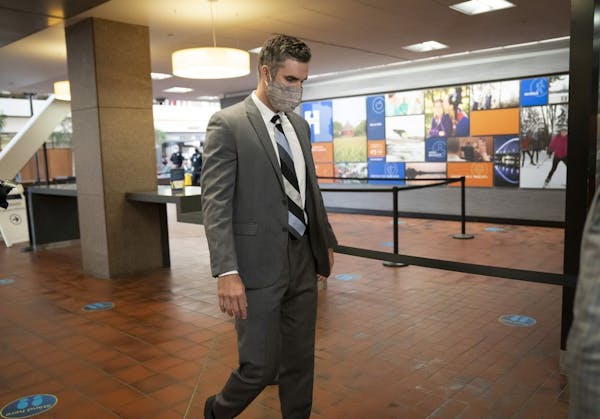An audio recording of a former Minneapolis police officer speaking with investigators about the killing of George Floyd was released by the courts Tuesday.
Thomas Lane told investigators he pulled his gun on Floyd after seeing Floyd sitting in a car reaching under a seat or between his seat and the console and because he did not immediately show his hands when ordered to do so.
Lane said the officers' plan to restrain a handcuffed Floyd stomach-down in the street was reasonable because he appeared to be on drugs.
"Once [Floyd] kind of stopped fighting us, I think I had said again, 'I think we should roll him onto his side,' and I believe [officer Derek] Chauvin said, 'We have him, there's an ambulance coming and we got him. We're just going to hold him here,' " Lane told investigators. "And that made sense to me just because I've had experiences with people who are OD'ing or they'll be out one minute and they'll come back and really be aggressive with you."
On May 25, Lane and former officer J. Alexander Kueng arrested Floyd on suspicion of passing a counterfeit $20 bill. During the arrest, former officer Derek Chauvin knelt on Floyd's neck, Kueng knelt on his back and Lane knelt and held onto his legs. Former officer Tou Thao fended off a gathering crowd.
Lane's 1-hour, 37-minute voluntary interview with investigators from the Minnesota Bureau of Criminal Apprehension was audio recorded; there was no video. Lane spoke in a flat, unemotional tone about the incident.
Lane did not bring up that Chauvin knelt on Floyd's neck. He first recounted Chauvin's actions about an hour into the interview under questioning by BCA special agent Brent Petersen. "He had his knee up and around, yeah, the shoulders and neck area," Lane said.
Several minutes later, Lane mentioned for the first time that Floyd had said he couldn't breathe.
"Were you getting a sense that Mr. Floyd was having a medical emergency?" Petersen asked.
"Yeah, I felt maybe that something was going on," Lane said, adding that he thought Floyd had passed out. He said he kept watch on a large muscle on the side of Floyd's back called the "lats" to see if it was moving, which would indicate that he was still breathing. When that stopped at some point, he said he asked Kueng to check Floyd's pulse.
A transcript of the interview was filed earlier in the case. Prosecutors filed the actual recording with the court last week to support their motion to try all four former officers charged in Floyd's killing at one trial. Evidence filed with such court documents is public data under state law.
A judge will hear oral arguments on the prosecution's motion at a Sept. 11 hearing. A trial is scheduled for March 8.

Want to share info with the Star Tribune? How to do it securely

'Safe recovery sites' would offer syringes, naloxone and more to people using drugs. The plan could be in peril.
New Minnesota GOP leaders seek peace with party's anti-establishment wing

Who is Republican Lisa Demuth, Minnesota's first House speaker of color?

